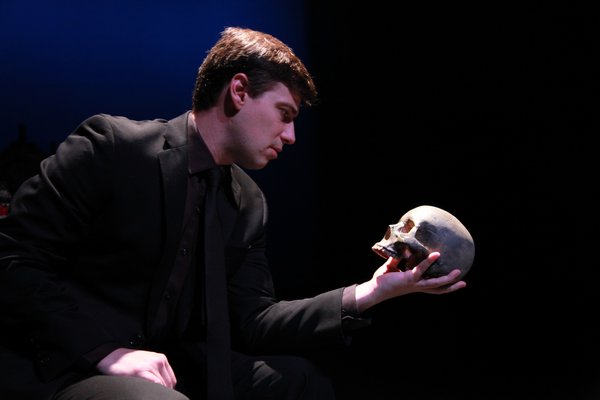
Anyone who takes on “Hamlet” has bitten off a great undertaking, but to quote the bard forthwith, “the play’s the thing,” and the play is meant to be done by actors for an audience, not just read on the page—even if the soliloquies, as written, are brilliant and familiar to the educated.
So it was that wife and husband Morgan and Tristan Vaughan, co-founders of the young Round Table Theatre Company, dedicated themselves to bringing the classic drama to life, tackling one of Shakespeare’s greatest tragedies at East Hampton’s Guild Hall.
She directs, he takes on the title role—a job that sounds daunting enough without the prodigious weightiness of the drama. “Hamlet” has inspired 26 ballets, six operas and 45 films, according to Guild Hall’s website. The result is uneven, but good lord, they are dealing with murder, madness, ghosts and probable suicide, and as such, do a credible job.
The Press’s own cliff notes to the uninitiated: Prince Hamlet of Denmark is hell-bent on avenging his father’s murder by his own brother—Hamlet’s uncle, Claudius. By the time Hamlet gets home from his studies in Wittenberg within the month, Hamlet’s mother, Gertrude, is already married to the very man who killed her husband. Who wouldn’t be crazed? Especially when the ghost of your father appears and instructs you to extract revenge? Madness is, undoubtedly, the only sane response. Meanwhile, Hamlet’s erstwhile girlfriend, Ophelia, gets lost in the process and wrapped up in her own loony business.
Mr. Vaughan has extensive training in Shakespearean acting, both in the United States and at the Royal Academy of Dramatic Arts in London. Hamlet, the role, has been interpreted by many of theater’s greats through the ages both on stage and in film, and the choice is just to be completely crazy or not to be. Mr. Vaughan, here, chooses the saner path and downplays the madness so much that the stricken prince is nearly normal. Sometimes, this critic just wanted him to chew the scenery more.
Josh Gladstone, artistic director of the John Drew Theater at Guild Hall with a passel of acting and directing credits of his own, is a delight to watch as he pulls out all of the humor in the character of Polonius, father to both one of Hamlet’s friends, Laertes, and Ophelia. Alas, he’s the first casualty, but someone had to do it. However, the beefy Mr. Gladstone returns as the Gravedigger with a flinty eye toward death and dying, and infuses that role with the right touch of cynicism.
Evan Daves and Michael Bartoli are two actors with numerous credits in Manhattan and elsewhere, and both amply fill the roles of the numerous parts that they show up in—soldier, courtier, players who do the play within the play with all the buffoonery therein. Mr. Daves is also Laertes, the grief-stricken son who kills Hamlet in a duel, only to realize too late that he probably shouldn’t have, and Mr. Bartoli is flawless when the role calls for him to be somewhat over-the-top as player or fop.
Fabrienne Bottero as Ophelia wears her madness exceedingly well, and her initial scream when she shifted from sane to crazy electrified the house. Also in the cast are Sawyer Avery, Peter Connolly, John Tramontana, Jeff Keogh and Dianne Benson, known to many locally as Dianne B, as the program lists her.
Director Morgan Vaughan and set designer Brian Leaver kept the stage simple—a bed, kingly chairs and a moving platform were it—but achieved mood with dramatic and effective lighting by Sebastian Paczynski. Actors came and went through the center and side aisles, inviting the audience into an otherwise bare-bones production. Instead of trying to set it in the 1600s, when it was originally written for, this version takes place in Denmark sometime between the two World Wars, complemented by Yuka Silvera’s costumes.
Instead of running four hours, scenes and characters have been cut, and this production is slightly less than three. “Hamlet,” slimmed down or not, is still prodigious, and at times Mr. Keogh as King Claudius seemed to be rushing to move it along.
Yet what catches your ear in any production of “Hamlet” are the numerous lines that have made their way into our language, sometimes adapted to modern idiom: “Neither a borrower nor lender be”; “Though this be madness, yet there is method in’t”; “To thine own self be true”; “The lady doth protest too much”; “In my mind’s eye”; “Brevity is the soul of wit.” Listen carefully and you’ll even hear “infinite jest” and “every dog has his day.” The familiar phrases prick up your ears, waiting for something old to suddenly answer the question, “Where did that come from?”
By the end, the familiar lines pile up just as the bodies generously do to rival the best of, say, CBS’s drama “Criminal Minds.” Our generation did not invent a thirst for murderous revenge and bloody doings. Shakespeare was onto something.
“Hamlet” will stage through Sunday, November 23, on Fridays and Saturdays at 7 p.m., and Sundays at 2 p.m. at the John Drew Theater at Guild Hall in East Hampton. Tickets are $25, $23 for members and $15 for children age 21 and under. For more information, call (631) 324-0806 or visit guildhall.org.